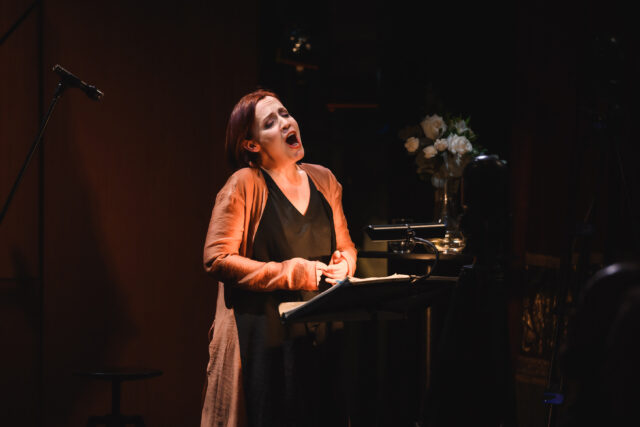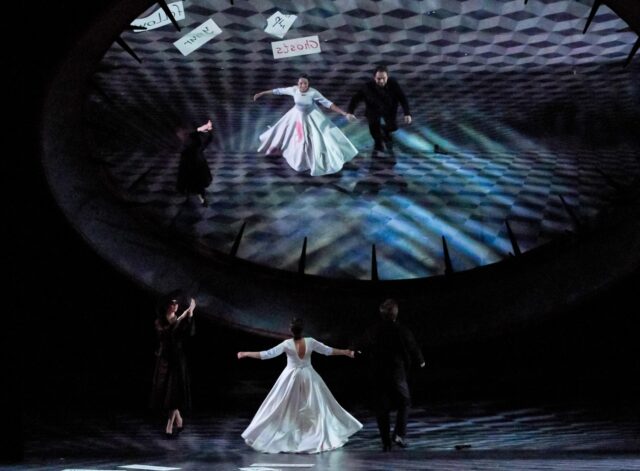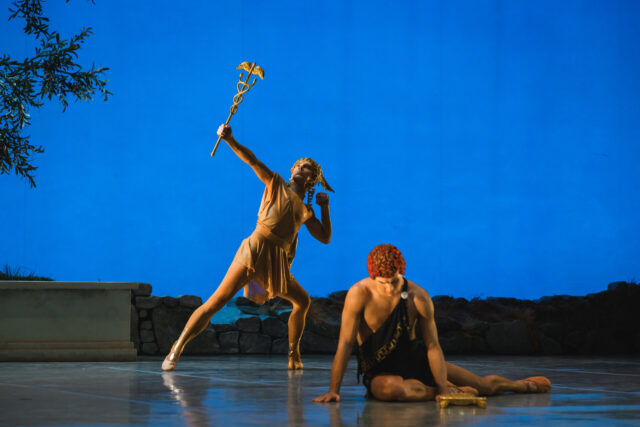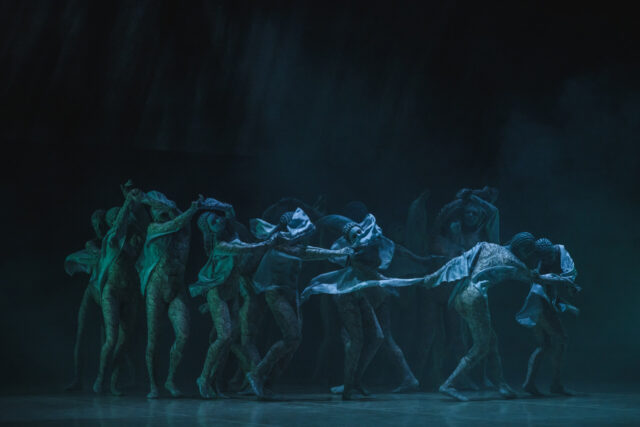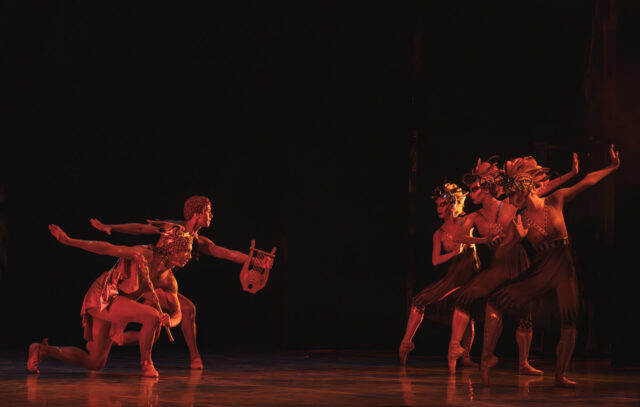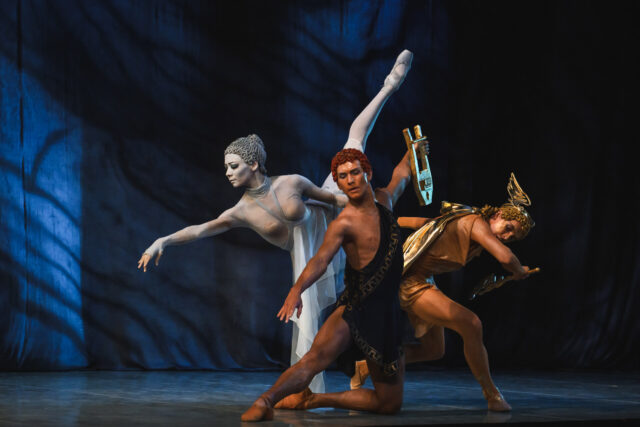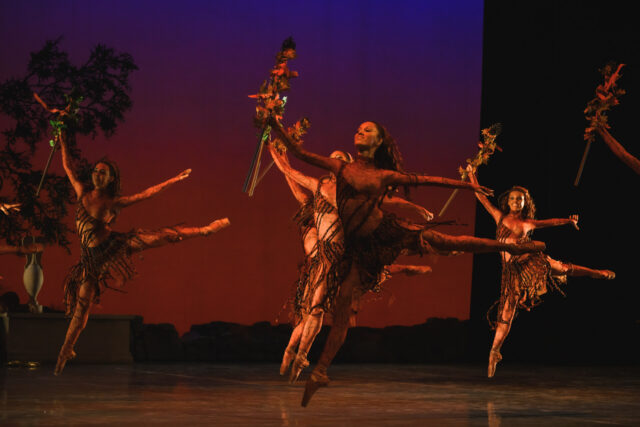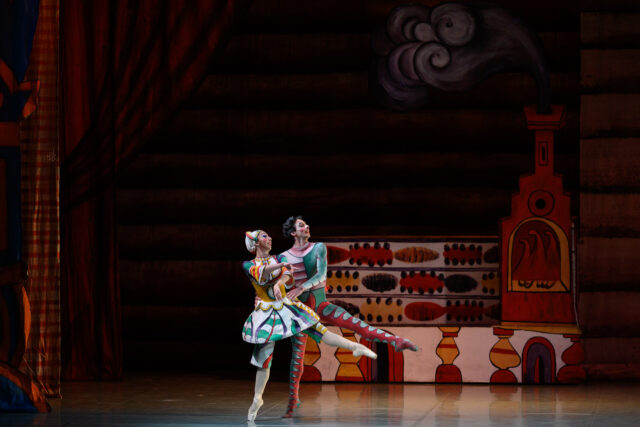
Orpheus
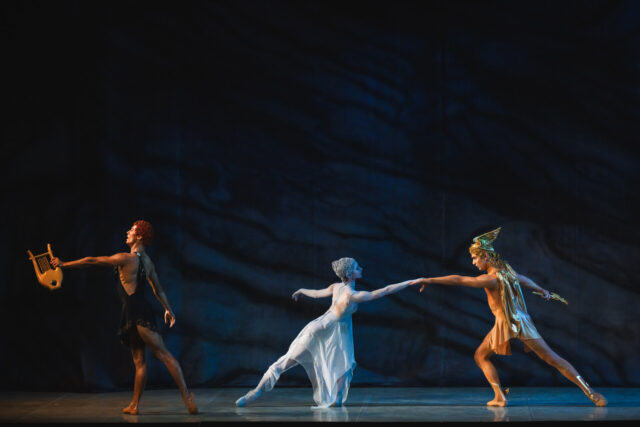
Libretto by Alexey Miroshnichenko
The ballet was written in 1947 and was presented in this stage version in Perm for the first time in 2025.
Following the opera Oedipus Rex (1927) and the melodrama Persephone (1934), Orpheus (1947) continues Igor Stravinsky’s series of stage works inspired by classical motifs. Its godfather was Lincoln Kirstein—according to the co‑founder of the New York City Ballet, the new one-act ballet was meant to pair with Apollo Musagète (1928), composed two decades earlier, and be performed on the same evening. Created at the close of Stravinsky’s neoclassical period, Orpheus occupies a unique place in his legacy: the musical language of the score already hints at the new era that would begin for the composer with the arrival of the 1950s. This iconic title in 20th‑century ballet theater returns to the Russian stage for the first time in recent years in an interpretation by conductor Vladimir Tkachenko and Alexey Miroshnichenko, who has crafted not only the choreography but also a new scenario for Perm’s Orpheus.
Synopsis
…ancient myth still determines not only the material,
but also the very forms of our creative thought.
Innokenty Annensky
The immortals are mortal, the mortals are immortal;
they live by each other’s death, they die by each other’s life.
Heraclitus
Scene One
The great singer and lyre player Orpheus has been living in distant mountainous Thrace. A wonderful gift of song he had, and his fame spread throughout Hellas. Wild animals stood frozen, as if enchanted, and listened to the divine sounds, and the trees, joining their branches, surrounded Orpheus and, having listened spelbound to his singing, could not move. But Orpheus’ songs have become sad, lips of the lyre player now only bear pain and longing. His dearly beloved wife Eurydice has died! Orpheus cannot reconcile himself with this loss, he still mourns his Eurydice, and all nature cries, hearing his sad songs. In vain do his friends try to encourage him and captivate him with their enthusiasm — Orpheus is inconsolable.
Is it possible to rescue Eurydice from the hands of death, from the dark kingdom of Hades? What could aid it? Zeus won his victories with cunning and strength. He, Orpheus, lacks both. But the gods endowed him with extraordinary musicality. If he could enchant fierce wild animals and control elements with his art, then surely he would be able to appease the mighty ruler of the underworld, Hades, and his wife, Persephone?
The messenger of the gods, the wayward god Hermes, overheard those thoughts. The grief of Orpheus, the beautiful son of Zeus and Maia, deeply touched him; he flew faster than the wind from Olympus to Orpheus with a caduceus in his hands. Only Hermes is allowed to be a guide between the world of the living and the dead. He will take Orpheus to the sad kingdom and will help him appear before Hades and Persephone.
Scene Two
Between the steep cliffs, the “stream of sorrow,” the dark river Acheron, heavily carries its bitter waters. On the other bank, the lamentations of the souls of the dead are barely audible. The goddesses of vengeance, the Erinyes, torment them for the misdeeds and crimes committed during life, and the souls of the dead patiently suffer in anticipation of their further journey. Hermes easily carries Orpheus across the river. The shades of the dead reach out to Hermes with a plea for release. The Erinyes try to attack Orpheus, but Hermes protects him and leads him to the throne of Hades and Persephone. The rulers of the underworld order the Erinyes to leave and are ready to listen to the lyre player. Orpheus knows: now his fate and the fate of Eurydice will be decided. It is necessary he uses all his skills and mastery, equals Apollo himself in art. This is his only hope for a miracle. And Orpheus starts a new song. Hades sees and hears the beautifully singing and playing young man in front of him. He sincerely feels sorry for him. Orpheus continues singing, his beautiful music sounding under the eternally silent vaults of the palace of Hades and Persephone. Once upon a time, the couple heard Apollo singing and playing cithara on Olympus. This young man is in no way inferior to him. It is amazing how talented some people are. But what to do with the poor Orpheus? So strong are his hopes and dreams of embracing his Eurydice again.
“Fine, Orpheus! I will return Eurydice to you, but you must fulfill one condition: you will go forward following the god Hermes, he will lead you, and Eurydice will follow you. But during the journey through the underworld, you must not look back. Remember! Look back — and Eurydice will immediately leave you and return forever to my kingdom.”
Orpheus agreed to everything. They quickly passed the kingdom of Hades. Finally, far ahead, there was light. This was the way out. And it seemed to become lighter all around, and you could even hear the singing of birds. “Is Eurydice following me?” Orpheus worried. “Has she remained in the kingdom of the dead? Perhaps she has fallen behind, for the path was so difficult, and will be doomed to wander forever in the darkness.” Orpheus is more and more worried about Eurydice. More and more often he stops. It is way lighter around. Finally, forgetting everything, he stops and turns around. Almost next to him is Eurydice, yet the moment he stretches out his arms to her, she sinks into the darkness. Orpheus kneels before Hermes, asking for help. But Hermes is inexorable.
Scene Three
As if turned to stone, Orpheus lies on Eurydice’s grave, overcome with despair. He had to experience the death of his beloved again, and he himself was the culprit of this second death. Orpheus decides to remain a faithful husband for the rest of his life and does not want to marry any woman in Thrace.
In the distance, there are trumpet sounds, loud cries and laughter. These are the Kikonian women celebrating a merry feast of the noisy Bacchus. They worship human flesh, carnal pleasures and the joys of earthly life. In their hands they hold thyrsi entwined with ivy and a cantharos — a sacred vessel from which they finish drinking the wine sacrificed to Dionysus. All this is alien to the wise and pure Orpheus, and he pays no attention to the reveling bacchantes. “Here he is, the hater of women!” one of them exclaims. She grabs Orpheus’ cithara and begins to play it, making hideous sounds. Out of his mind with indignation, Orpheus jumps up, breaks the cup of wine and takes the cithara away from the drunken bacchante. The drunken women’s anger is heated to the limit. Unable to bear the insult, they beat Orpheus to death with their thyrsi.
The hour has come for Orpheus to descend into the kingdom of Hades, but no longer as a supplicant, but as a man who has completed his earthly journey. The great singer meets his Eurydice again and embraces her lovingly. From now on, they can be inseparable. Now Orpheus can turn around without fear to see if Eurydice is following him. And in the world above, the tutor of the Muses, the golden-haired Apollo, sings of the divinely inspired art of the “father of songs” Orpheus, the son of the beautifully sonorous muse Calliope and the river god Oeagrus, a descendant of the famous Titan Atlas.
Stage Directors
Musical director and conductor
Libretto author and choreographer
Alyona Pikalova
Set designer
Costume designer
Lighting designer
Ivan Khudyakov-Vedenyapin
Assistant conductor


